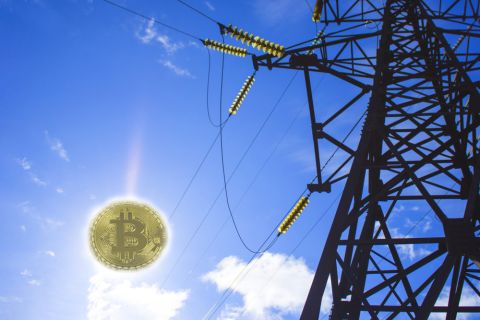It's difficult to fathom the depth of hypocrisy. And yet here, in the U.S., our energy hypocrisy doesn't even register as an election-year issue.
Here is how it plays out.
The U.S., in a staggering energy and economic reversal eight years in the making, deftly moves from the position of liquefied natural gas (LNG) importer to potential LNG exporter.
In case you have been living under a rock, we are no longer "exploring" for natural gas here at home—we are manufacturing it.
Case in point—according to Tudor Pickering Holt & Co.—Chesapeake has 400 to 500 Haynesville shale natural gas wells that have been drilled but not completed. They are waiting for higher gas prices before spending additional dollars to complete their wells. Chesapeake's completion cost is about 50% of total completed well cost. Those drilled but not completed wells sit on a virtual natural gas inventory shelf waiting for a better day.
The new shelf life of U.S. oil and gas reserves is something that the rest of the world has noticed. That is definitely the case in China, a country in desperate need of natural gas options. China, lest we forget, is our largest foreign-country creditor.
The very public and private investments made by the Chinese government through their public company energy arms CNOOC Ltd. and PetroChina amount to multiple billions of dollars of investments right here in North America.
The U.S. finally has a product, a natural gas widget if you will, that through good old American ingenuity (think horizontal drilling, hydraulic fracturing applied to shale formations) is producing super-abundant volumes of natural gas in a better/cheaper/smarter way than anyone else in the world.
And now, many of those foreign national energy giants would like to export their investment, that "made in the U.S.A." natural gas widget, home to their own country.
Beijing made a mid-September announcement that foreign joint ventures have been invited to bid for shale gas exploration licenses in a new tender process. This is a significant policy change that gives foreign companies a far greater role in developing China's potentially huge shale gas reserves.
Bait and switch
But, in what could, should and will be called the mother of all bait-and-switch games, the U.S. Department of Energy (DOE) has decided to "study" the impact on U.S. consumers of LNG exports to non-FTA countries. What is the relevance of free trade agreement (FTA) versus non-FTA countries? It would be difficult to impossible to aggregate the 16 some-odd free-trade agreement countries into a meaningful commitment to support the construction of an LNG export facility in the U.S. The demand associated with non-FTA countries is critical. Without that potential demand, any LNG export project located in the U.S. is considered fatally flawed.
What happened to the post World War II and Cold War unstated goal of exporting our economic model (capitalism and free markets) and our way of life (freedom and the rule of law)?
Shouldn't free markets dictate where a U.S. produced natural gas widget is consumed?
I am sure that Cheniere Energy's CEO Charif Souki, (one of the lone recipients of a DOE LNG non-FTA export license at Sabine Pass, Louisiana) would agree with that sentiment. Cheniere received its non-FTA export license and then our government decided to implement the DOE export study. It is as if the current administration realized that in the Sierra Club's world of "beyond natural gas" campaigns, drilling here and exporting over there would not be acceptable. Who would find it unacceptable? Environmentalists opposed to hydraulic fracturing and anything else related to natural gas drilling in the U.S. While this administration delayed its decision to allow the granting of additional non-FTA export licenses, Souki sold 90% of the capacity in his Sabine Pass facility. Great timing.
'A game changer'
I recently had the opportunity to ask George Friedman, author of The New York Times bestseller, "The Next 100 Years," what the geopolitical impact of U.S. LNG exports could be. He said simply "it's a game changer."
The strategic implication and value of natural gas as an energy resource is not lost on China, a country that sits on the U.S.'s non-FTA list.
China's annual consumption of natural gas is about 10% of U.S. annual consumption. They, and many others, expect that consumption to grow exponentially over the next 10 to 20 years. China has invested billions in a 1,100-mile east-west pipeline to access natural gas reserves in Central Asia. It also recognizes that the close proximity of its offshore deepwater reserves in the South China Sea are much closer to the final point of consumption and thereby, extremely valuable. In fact, CNOOC chairman, Wang Yilin, recently stated that "large-scale deep-water rigs are our mobile national territory and a strategic weapon."
The South China Sea is an area with many overlapping claims of ownership by different countries. Last month, China warned U.S. Secretary of State Hillary Clinton, "not to take sides in sea disputes." Chinese Foreign Ministry Spokesman Hong Lei stated: "We have noted that the United States has stated many times that it does not take sides… We hope that the United States will abide by its promises and do more that is beneficial to regional peace and stability, and not the opposite."
It is an interesting dilemma for the U.S. Our two regional allies, Japan and the Philippines, are at odds with China in a high-stakes game of "who owns what" in the oil and gas production rich area of the South and East China Seas. What should we do? What is the best way to project American power?
China has six LNG import facilities with 11 additional LNG import sites on the drafting table. Imagine 11 additional LNG facilities at several billion dollars per copy. So we must ask ourselves, what geopolitical message would we send the fastest-growing nation in the world if we decide to take our possible LNG exports off the lazy Susan of Chinese energy supply options?
Sadly, I don't think the Chinese will ever again be surprised by a less-than-capitalistic response from the U.S. on an energy transaction. You may recall back in August 2005 that CNOOC withdrew its bid for Unocal ending an eight-month drama. In what started as a business transaction, but progressed into a major drama involving the U.S. Congress, the deal was killed. The Chinese psyche no longer considers the words "free market" and "U.S." to be synonymous.
China obviously recognizes that foreign natural gas is expensive, but one must wonder what its real internal abilities are for in-country development.
China's shale gas reserves
China is blessed with what some geologists believe to be the largest volume of shale gas reserves in the world. In 2011, the International Energy Agency estimated that China's total recoverable natural gas reserves could be 50 trillion cubic meters, 70% of that in shale beds. In a recent Wall Street Journal article, Paul B. Farrell said, "China's neo-capitalism [is] beating U.S. free markets." I am not sure that I would agree, especially when it comes to comparative natural gas production and reserves. According to a special report on Chinese domestic natural gas efforts in The Economist, "only a handful of test wells for shale gas have been sunk, and it looks as though the geology may make it harder to get at than America's." That insight fits with two anecdotal stories that I heard during a recent trip to China.
According to a friend with PetroChina, only 25 horizontal shale wells have been drilled in all of China. Only 11 of those are considered producers. This compares to approximately 38,000 horizontal shale wells drilled here in the U.S. to date. Additionally, another friend in Chengdu, China, indicated that the last time it fracked a horizontal shale well in the Sichuan Basin, that "nearly every frack truck in Asia was on location."
So, imagine for a moment that you are a member of the planning group in charge of energy within China's National Development and Reform Commission. The pressure is on. You have to come up with some way, or multiple ways, to satisfy the burgeoning appetite for natural gas in your ever-growing urban areas. What type of pressure? The equivalent of nearly two-thirds of the U.S. population has moved into Chinese coastal cities in the last decade. This trend is not expected to wane in the near future.
Different forecasts expect a five-fold demand increase in five years. Japan's Fukushima reactor incident has caused LNG pricing in the Pacific Basin to run as high as $14 per million Btu. You face additional competition to purchase LNG because of that Fukushima reality among your neighbors. Some of those neighboring countries are the same countries that you are in dispute with over ownership of potential oil and gas reserves in the East and South China Sea. Now you hear that the U.S. wants to study whether or not it is wise to export LNG.
As if to underscore the energy irony, the Obama administration announced September 17 that the DOE economic impact study on LNG exports is now expected to be completed by the end of the year. "The Department of Energy takes its statutory responsibility to make public interest determinations on natural gas export applications very seriously and is committed to taking the time necessary to get the decisions right." That is the third delay on this report and an obvious deferral to a post-election time period. The effort to avoid another Keystone Pipeline controversy is blatantly obvious.
Evidently, Canada is not as shortsighted as the U.S. The Kitimat, British Columbia, LNG facility is alive, thriving and planned for completion by 2015. Kitimat partners EnCana, EOG and Apache obviously understand what is at stake for Canadian production and its access to Asian demand. In turn, the Canadian government must realize the value of jobs and royalty revenue created by such an effort. It is an easy thing to anticipate a time in the near future when one LNG tanker (think 3 Bcf) leaves Kitimat every day bound for an Asian consumer, most likely China.
When will our own politicians realize the depth of their energy hypocrisy and the lost opportunity for projecting real geopolitical power while helping create jobs right here at home?
Recommended Reading
Report: Freeport LNG Hits Sixth Day of Dwindling Gas Consumption
2024-04-17 - With Freeport LNG operating at a fraction of its full capacity, natural gas futures have fallen following a short rally the week before.
Permian NatGas Hits 15-month Low as Negative Prices Linger
2024-04-16 - Prices at the Waha Hub in West Texas closed at negative $2.99/MMBtu on April 15, its lowest since December 2022.
BP Starts Oil Production at New Offshore Platform in Azerbaijan
2024-04-16 - Azeri Central East offshore platform is the seventh oil platform installed in the Azeri-Chirag-Gunashli field in the Caspian Sea.
US Could Release More SPR Oil to Keep Gas Prices Low, Senior White House Adviser Says
2024-04-16 - White House senior adviser John Podesta stopped short of saying there would be a release from the Strategic Petroleum Reserve any time soon at an industry conference on April 16.
Core Scientific to Expand its Texas Bitcoin Mining Center
2024-04-16 - Core Scientific said its Denton, Texas, data center currently operates 125 megawatts of bitcoin mining with total contracted power of approximately 300 MW.


